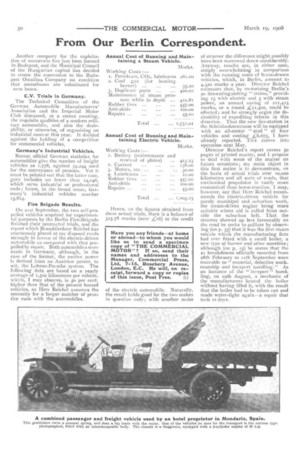From Our Berlin Correspondent.
Page 26

If you've noticed an error in this article please click here to report it so we can fix it.
Another company for the exploitation of motorcabs has just been formed in Budapest, and the Municipal Council of the Hungarian capital has decided to renew the concession to the Budapest Omnibus Company on condition that motorbuses are substituted for orse buses, C.V. Trials in Germany.
The Technical Committee of the. German Automobile Manufacturers' Association and the Imperial Motor Club discussed, at a recent meeting, the requisite qualities of a modern military automobile, and also the desirability, or otherwise, of organising an industrial contest this year. It decided against the holding of a competition for commercial vehicles.
Germany's Industrial Vehicles.
Recent official German statistics for automobiles give the number of freight vehicles as 1,778, against 34,244 used for the conveyance of persons. Yet it must be pointed out that the latter category includes no fewer than 14,046, which serve industrial or professional ends; hence, in the broad sense, Germany's industrial vehicles number 15,824.
Fire Brigade Results.
On 21st September, the two self-propelled vehicles acquired for experimental purposes by the Berlin Fire-Brigade finished their protracted trials, and the report which Branddirektor Reichel has courteously placed at my disposal reads strongly in favour of the electric-driven automobile as compared with that propelled by steam. Both automobiles were made in Germany, although, in the case of the former, the motive power is derived from an Austrian patent, to wit, the Lohner-Porsche system. The following data are based on a yearly average of 1,5oo kilometres per vehicle, which, I may observe, is 5o . per cent. higher than that of the present horsed vehicles, as Herr Reichel assumes the necessity for a larger number of practice runs with the automobiles. Hence, on the figures obtained from these actual trials, there is a balance of 525.78 marks (over 1J26) to the credit of the electric automobile. Naturally, the result holds good for the two makes in question only ; with another make of steamer the difference might possibly have been narrowed down considerably. Anyway, results are, in either case, simply overwhelming in comparison with the running costs of horse-drawn vehicles, which, in Berlin, amount to 4,320 marks a year. Director Reichel estimates that, by motorising Berlin's
20 fire-extinguishing " trains," providing 15 with electric and 5 with steam power, an annual saving of 221,415 marks, or a round .11,500, could be effected; and he strongly urges the desirability of expediting reform in this direction. That the new fire-station in the Schiinlankerstrasse will be equipped with an all-motor " stud " of four vehicles and costing ..6,675, I have already reported. This comes into operation next May.
Director Reichel's report covers so pages of printed matter, and I propose to deal with some of the matter on future occasions ; my main object in this first notice is to demonstrate, on the basis of actual trials over to,eoo kilometres and all sorts of roads, that mechanical propulsion is vastly more economical than horse-traction. I may, however, say that Herr Reichel recommends the electric-driven vehicle for purely municipal and suburban work, the steam-driven engine being more suitable where aid is called from outside the suburban belt, That the steamer showed up less favourably on the road he seeks to palliate by observing (on p. 35) that it was the first steam vehicle which the manufacturing firm had ever fitted with a small boiler, a new type of burner and other novelties; although (on p. 15) he states that the
21 breakdowns officially recorded from 28th February to tith September were traceable to " material, defective workmanship and inexpert handling." As an instance of the " inexpert " handling, on 29th August, a mechanic of • the manufacturers heated the boiler without having filled it, with the result that the boiler had to be taken out and made water-tight again—a repair that took 12 days.






























